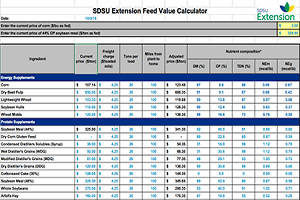By Adele Harty
Feed Value Calculator
Feed costs exceed 50% of the annual beef cattle production costs and with the current market situation, the pressure to determine the most cost-effective feedstuffs has become even more important.

SDSU Extension has developed a feed value calculator to compare protein and energy supplement options. The spreadsheet allows producers to select supplemental feeds and compare them to baseline feeds. The benchmark for energy supplements in this spreadsheet is corn, whereas for protein supplements is soybean meal (44% Crude Protein; CP).
Using the Calculator
To generate the most accurate results producers should have feeds analyzed and include in the spreadsheet the actual laboratory results. With byproduct feeds analysis can vary significantly from batch to batch. These differences may alter the ration, which affects cattle performance and ration cost.
The spreadsheet compares feeds costs per ton based on their nutrient concentration. It then calculates how much to pay for each feed when compared to corn or soybean meal. For an accurate comparison delivery and storage costs for each feed in dollars per ton should be included in the calculation.
Questions to Consider
Questions that need to be addressed:
- Do you currently have the equipment to handle this product?
- Are there any special considerations with storage? With condensed distiller’s solubles for example, is a buried tank or a heated room available to store this product?
- How far will the product have to be hauled and how much will this add to the costs? The higher the moisture in the product, the more water is being transported which may decrease the economic value of some high moisture feeds. For high moisture feeds (>70% moisture) to be priced competitively, the farm needs to be located within an approximate 50-mile radius of the plant. No matter what feeds are used, always evaluate freight costs.
Click here to see more...